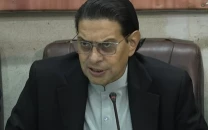Bank defaults case: Court seeks loan write-offs record since 2003
A commission has been formed to investigate whether political influence was involved.

The Supreme Court on Thursday asked the State Bank of Pakistan to provide details of the loans written off by commercial banks after the 2003 expiry of Circular 29, the central bank’s guidelines for banks to manage non-performing loans.
“The court should be briefed about written off loans after the expiry of circular 29,” said Chief Justice Iftikhar Muhammad Chaudhry.
A three-member bench was hearing a case in which the apex court took suo motu notice of all loans written off by commercial banks between 1971 and 2009, an amount that comes to over Rs256 billion over the 28-year period. While the amount of loans written off may sound like a lot, it is in fact equal to less than 4.6% of the total assets of the banking system as of April 2011, the latest month for which figures are available.
“We know that billions of rupees worth of loans were written off in the last two years,” said the chief justice during the hearing. “The defaulters get their loans waived off by using political influence and developed their business manifold. It seems that the SBP was non-vigilant.”
The court directed Syed Iqbal Haider, the lawyer representing the State Bank, to get instructions from the central bank governor and report back to the court at the next hearing, scheduled for May 30.
The court also asked for records on loan write-offs that took place during the last two years. According to data released by the central bank, the proportion of loans written off over the last two years was around 4.8% of the total new loans issued during that period.
The chief justice claimed to be aware of illegal practices in loan write-offs by banks, though he did not specify what practices he was referring to and did not provide details. “Those who were responsible of waiving off loans should be pointed out and brought before justice,” he added.
Justice Sair Ali asked what regulations were guiding loan write-off policy at commercial banks since the expiration of Circular 29, which lapsed on April 14, 2003.
The chief justice opined that loan write-offs after 2003 were a matter of criminal negligence. He asked Haider if there was a law that would hold a bank officer accountable in case a loan he or she authorised went into default.
Loan write-offs are a normal process at any commercial bank around the world. While most loans made by banks in Pakistan are paid back on schedule and in accordance to the terms agreed to between the bank and the borrower, a small percentage of loans are not paid back due to financial difficulties that the bank may run into.
Loans that borrowers fail to pay back are called non-performing loans. When banks were mostly owned by the government, prior to the 1990s, it was common for loans to be written off not because the borrower lacked the ability to pay but rather because they were able to use political influence to write-off loans. Since the privatisation of the banking sector, this practise has seen a sharp drop and is now restricted mostly to state-owned banks.
The central bank typically asks the banks to write off loans where they cannot recover the money so that their balance sheets accurately reflect the balance between their assets and liabilities. (Loans made by the bank are its assets and the deposits it keeps on behalf of its customers are its liabilities.) Since January 1, 2005, the ratio of non-performing loans to total new lending has been less than 2.8%, a remarkably low figure where NPL ratios of over 25% were not uncommon before privatisation.
A commission, headed by Jamshed Ali Shah, a retired judge, has been formed to investigate whether political influence was involved in loan write-off decisions during the period in question. The SBP is eager for the commission to begin its work.
Published in The Express Tribune, May 27th, 2011.



















COMMENTS
Comments are moderated and generally will be posted if they are on-topic and not abusive.
For more information, please see our Comments FAQ